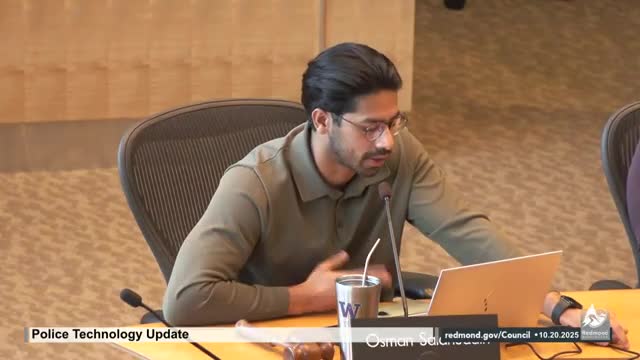Redmond police say ALPR data-sharing safeguards worked after Flock network errors; council seeks written assurances and retention review
Get AI-powered insights, summaries, and transcripts
Subscribe
Summary
Redmond Police Chief Daryl Lowe told the Public Safety and Human Services Committee on Oct. 21 that the city never enabled Flock’s nationwide ALPR data sharing; audits found and corrected mistaken external network links, and no out-of-state or federal agency had queried Redmond data.
Redmond Police Chief Daryl Lowe briefed the Public Safety and Human Services Committee on Oct. 21 about the city’s automated license-plate reader (ALPR) program managed by Flock and a separate drone-as-first-responder program. Lowe said Redmond never enabled Flock’s nationwide data-sharing option; an external software update defaulted some programs elsewhere to national sharing, but Redmond’s implementation and internal controls prevented any unauthorized queries of its data.
Lowe described the city’s safeguards: requests for ALPR data must be approved centrally by the Office of the Chief of Police, and searches by department staff require a case number and an investigative nexus. An internal audit and a Flock audit confirmed that, while network-sharing links to Lincoln County (Idaho) and Medford (Oregon) were mistakenly active in Redmond’s account, those external networks were deactivated and neither agency requested Redmond data. Lowe also said no federal agency has ever requested Redmond’s ALPR information.
Council members pressed for more protections and transparency. Council Member Novakimena asked how the city would respond if a mistake led to a resident’s data being provided to a federal agency; Lowe said the Keep Washington Working Act limits direct queries and that Flock has a back-end filter for Washington customers that blocks searches referencing immigration or reproductive-rights criteria. Lowe said local legal recourse would be limited if another agency obtained data by knowingly falsifying an investigative request; he said that would likely be a criminal matter for state attorneys-general or law-enforcement prosecutorial channels.
Council members asked for a clear public statement and documentation from Flock. Kritzer asked for written confirmation from Flock that Redmond data has not been shared with federal agencies; Lowe said he had received an email confirmation and requested a formal letter for the city file. Council members also asked the police department to request that Flock notify the city if outside agencies contact Flock directly. Lowe said he would follow up.
Policy and operational detail: Lowe referenced Redmond Police Department policy (sections 3.41 and 6.12) governing technology and data use and said the department redacts license-plate data in public-records responses when appropriate to protect personally identifiable information. He also said the city currently shares its ALPR network listing with roughly 106 other law-enforcement agencies that may request information, but requests are not automatic and require approval.
Other items: Lowe noted the drone-as-first-responder pilot has shown value and he may seek council support to expand the program in 2026. Lowe gave an example of an armed-robbery investigation in which ALPR data helped identify a suspect and led to arrest and search-warrant work.
Council direction and next steps: Council members asked for the following follow-up: (1) a written assurance from Flock confirming Redmond data was not shared with federal agencies and describing Flock’s Washington-specific filters; (2) evidence of the audit trail showing the mistaken external network entries were turned off; (3) a proposal to revisit the ALPR data-retention period (currently 30 days) and whether a shorter retention window is advisable; and (4) a report on alternative vendors and a potential procurement/transition plan if the council wants to move away from Flock. The police department agreed to provide a public statement and to bring a written follow-up to the next Public Safety and Human Services Committee meeting.
Why it matters: The matter intersects resident privacy, immigration concerns, municipal oversight of surveillance technology and the balance between investigative benefit and civil-liberties risk. Council members emphasized vendor accountability and timely public communication.
Next steps: Chief Lowe will request written confirmation from Flock for the city record, ask that Flock notify Redmond if outside parties contact the vendor directly, provide audit documentation about the network error, and return to committee with retention-policy proposals and options for vendor alternatives.
